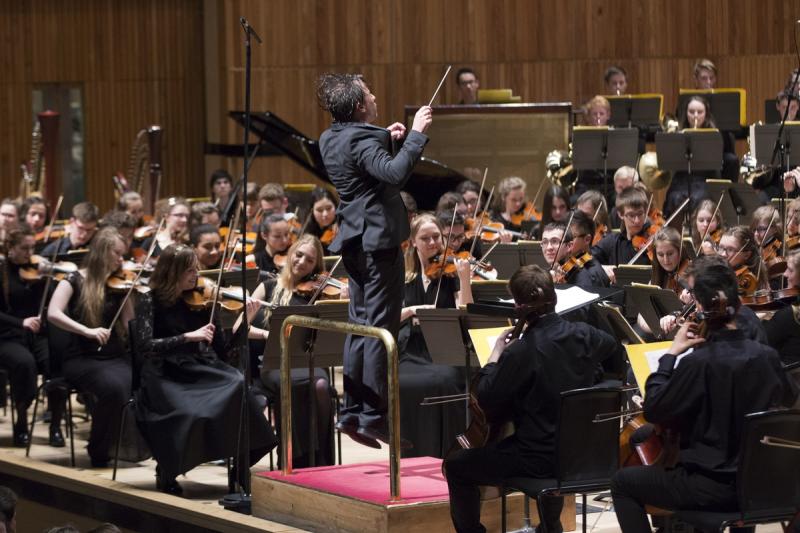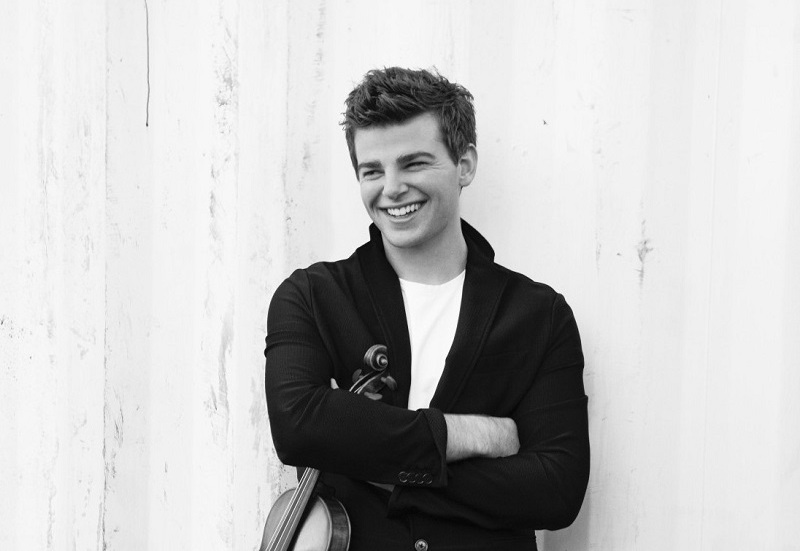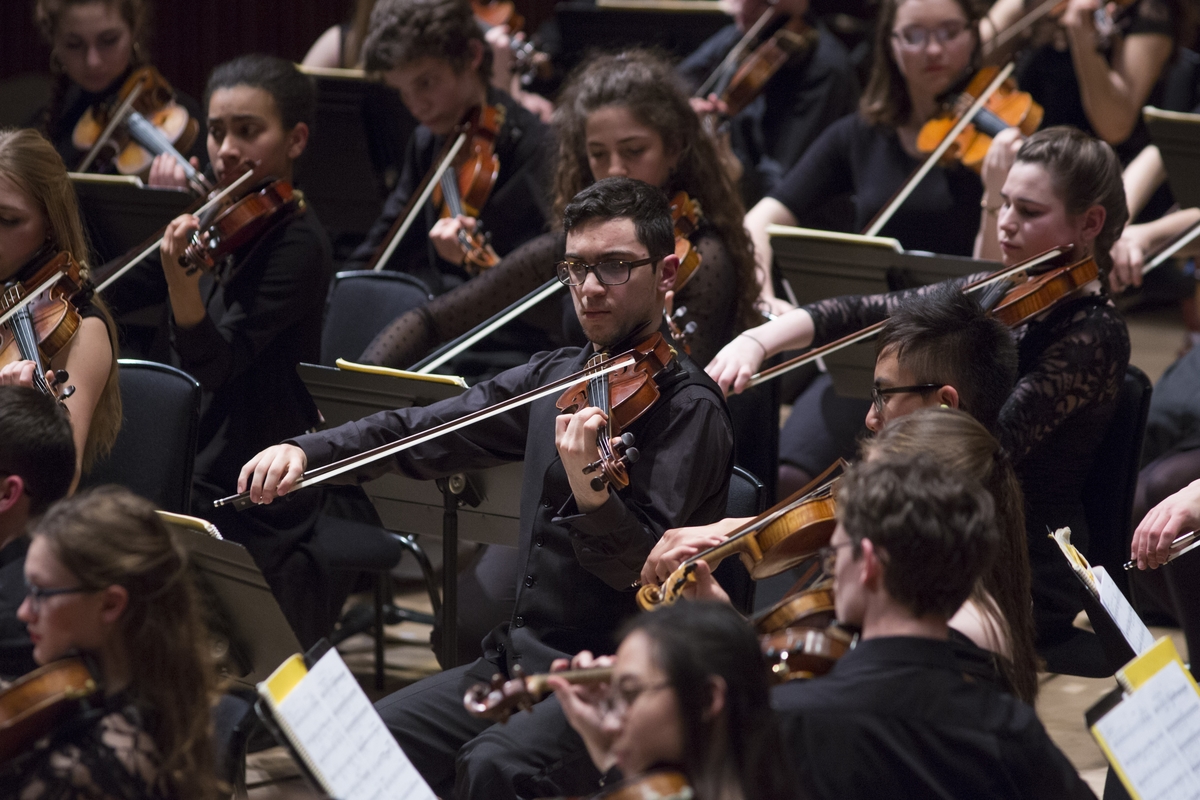Hoopes, National Youth Orchestra, Järvi, RFH | reviews, news & interviews
Hoopes, National Youth Orchestra, Järvi, RFH
Hoopes, National Youth Orchestra, Järvi, RFH
Adrenalin rushes plus sophistication in fire music by Stravinsky and Daugherty

On the panel to judge a competition between 14 Dutch school orchestras in Amsterdam's Concertgebouw last month, I couldn't resist using my speech to compare their state-school provenance with our own divisive musical education. I was thinking of two figures I'd been given – that when the National Youth Orchestra of Great Britain started, only five per cent of its young musicians were from private and public schools, whereas now it was 85 per cent.
Last week I learned the latter figure was wrong: current CEO and Artistic Director Sarah Alexander has got it down to 50/50, working on the notion that if a state school musician is less polished at auditions, he or she may stand to gain more from the experience. Standards have not been compromised; last night's was as stunning a concert as any from the NYO, with an extra adrenalin rush from the youngest of the Järvi conducting dynasty, Kristjan, no less individual than his brother or father. Without a doubt the culminating performance of Stravinsky's complete Firebird ballet was the most physically exciting I've ever heard. That its livestream, available for a limited time, wasn't taken up by BBC Four is a great pity – it would have won orchestral music new admirers – but at least the Southbank is reaching out to showcase this extraordinary institution in a way that the Barbican did not. Watch this space for further developments with its new associate orchestra.
 “As each of the works on the programme begins with ‘fire’,” writes leader Millie Ashton in the programme, “there’s no way NYO’s energy and totally teenage passion won’t do so.” The least familiar flames came from American composer Michael Daugherty’s Fire and Blood, a showcase for the orchestra and the soloist, Chad Hoopes (pictured above), who won first prize in the Young Artists Division of the Menuhin Competition 10 years ago (the current London competition is running this week).
“As each of the works on the programme begins with ‘fire’,” writes leader Millie Ashton in the programme, “there’s no way NYO’s energy and totally teenage passion won’t do so.” The least familiar flames came from American composer Michael Daugherty’s Fire and Blood, a showcase for the orchestra and the soloist, Chad Hoopes (pictured above), who won first prize in the Young Artists Division of the Menuhin Competition 10 years ago (the current London competition is running this week).
He’s the real thing: full, passionate tone, great intensity and musical intelligence. Daugherty’s concerto, though entertaining and tuneful, isn’t. Sounding like Khachaturian on a good day (which that composer’s Violin Concerto isn’t), its outer movements homaging the American motor industry are full of lively syncopations and opportunities for the large percussion section to switch instruments, as well as a good mix of double and treble stopping runs and singing lines for the soloist. The slow movement, “River Rouge”, runs on too long, and the mountain eventually gives birth to a molehill in the mariachi tune led by two trumpets (superb Tijuana touches here from Aaron Akugbo and Adam Meyer). Still, it was wonderful to see the rapport between Hoopes and Järvi, and the encore – a movement from Telemann’s Ninth Suite which Hoopes had played in the first round of the competition – provided a needful drop in temperature.
There was nowhere in the two Stravinsky works to relax; Järvi is a coiled spring bringing feverishness even to the more feminine dances of The Firebird. His full-body expressionism wasn’t to all tastes, but as another musician put it, he gives energy to the young players rather than leaching it from them. You could hear what you saw as Fireworks exploded towards its final display; you could gauge the results from the huge string section – 20 each of violin sections, 12 double basses bringing revelations to The Firebird’s “Infernal Dance” – on which he lavished the most love, with Los Angeles/Hollywood Bowl voluptuousness at times. Neither woodwind or brass seemed to suffer from the relative lack of attention.
 It’s also worth remembering that Stravinsky was only 25 when Diaghilev found himself captivated by Fireworks and (eventually) gave him the job of a long first original score for the Ballets Russes. The Firebird’s first half can feel over mimetic, over languorous, but not in the hands of players who are young enough to treasure its naïve storytelling. Surtitles with the action, Philharmonia-style, would have helped, but all eyes were still on Järvi and his players. Winsome woodwind solos, outstanding especially from oboist Eleanor Sullivan, carried the narrative; after the devastating climactic dance, faster than I’ve ever heard it but also exemplary in its clarity, and an unusually slow Berceuse led by bassoonist Lucy Dundas, the soul of ogre Kashchey inside an egg was smashed to brilliant smithereens and out of the magical string tremolos – these players can do the most sophisticated pianissimos – came an absolutely perfect horn solo from Livi Gandee.
It’s also worth remembering that Stravinsky was only 25 when Diaghilev found himself captivated by Fireworks and (eventually) gave him the job of a long first original score for the Ballets Russes. The Firebird’s first half can feel over mimetic, over languorous, but not in the hands of players who are young enough to treasure its naïve storytelling. Surtitles with the action, Philharmonia-style, would have helped, but all eyes were still on Järvi and his players. Winsome woodwind solos, outstanding especially from oboist Eleanor Sullivan, carried the narrative; after the devastating climactic dance, faster than I’ve ever heard it but also exemplary in its clarity, and an unusually slow Berceuse led by bassoonist Lucy Dundas, the soul of ogre Kashchey inside an egg was smashed to brilliant smithereens and out of the magical string tremolos – these players can do the most sophisticated pianissimos – came an absolutely perfect horn solo from Livi Gandee.
The riotous happy ending was even capped by the encore, Tchaikovsky’s "Dance of the Tumblers" from his Snow Maiden music – usually overshadowed by Rimsky-Korsakov’s version, but the Järvi family always find unusual encores. With standing trumpets and audience participation, it had a touch of the Simón Bolívar Orchestra’s showbiz about it, and that’s something we could all do with to add to the sheer joy of youthful music-making.
- Programme repeated in Liverpool tonight (9 April) and Manchester (10 April)
- Livestream of the concert available for a limited time on the Southbank's YouTube channel
- David Nice's blog on Orkestival 2016, the Dutch festival of school orchestras
rating
Explore topics
Share this article
Subscribe to theartsdesk.com
Thank you for continuing to read our work on theartsdesk.com. For unlimited access to every article in its entirety, including our archive of more than 15,000 pieces, we're asking for £5 per month or £40 per year. We feel it's a very good deal, and hope you do too.
To take a subscription now simply click here.
And if you're looking for that extra gift for a friend or family member, why not treat them to a theartsdesk.com gift subscription?
more Classical music
 Classical CDs: Cowhorns, gloves and marching drums
Contemporary sounds from Norway, plus rediscovered American and a brass dectet
Classical CDs: Cowhorns, gloves and marching drums
Contemporary sounds from Norway, plus rediscovered American and a brass dectet
 Kolesnikov, Wigmore Hall review - celestial navigation through a cabinet of wonders
Quirky but brilliant programme finds connections between unlikely bedfellows
Kolesnikov, Wigmore Hall review - celestial navigation through a cabinet of wonders
Quirky but brilliant programme finds connections between unlikely bedfellows
 Orchestre Révolutionnaire et Romantique, Sousa, St Martin-in-the-Fields review - Beethoven, younger than springtime
An exuberant cobweb-clearing symphony cycle
Orchestre Révolutionnaire et Romantique, Sousa, St Martin-in-the-Fields review - Beethoven, younger than springtime
An exuberant cobweb-clearing symphony cycle
 Hough, Hallé, Elder, Bridgewater Hall, Manchester review - affection and adventure
Sir Stephen Hough’s piano concerto receives its European premiere
Hough, Hallé, Elder, Bridgewater Hall, Manchester review - affection and adventure
Sir Stephen Hough’s piano concerto receives its European premiere
 Bavouzet, Manchester Camerata, Takács-Nagy, Stoller Hall, Manchester review - fun with abandon
Approaching the final goal of ‘Mozart, made in Manchester’
Bavouzet, Manchester Camerata, Takács-Nagy, Stoller Hall, Manchester review - fun with abandon
Approaching the final goal of ‘Mozart, made in Manchester’
 Dunedin Consort, Mulroy, Wigmore Hall review - songs of love old and new
First-rate chamber choir explore contemporary and Renaissance approaches to amour
Dunedin Consort, Mulroy, Wigmore Hall review - songs of love old and new
First-rate chamber choir explore contemporary and Renaissance approaches to amour
 Coote, LSO, Tilson Thomas, Barbican review - the triumph of life
A great, ailing conductor rises to Mahler's mightiest challenge
Coote, LSO, Tilson Thomas, Barbican review - the triumph of life
A great, ailing conductor rises to Mahler's mightiest challenge
 Britten Sinfonia, The Marian Consort, Milton Court review - a journey around turbulent spirit Gesualdo
Contemporary homages among the works in this celebration of the Renaissance 'badass'
Britten Sinfonia, The Marian Consort, Milton Court review - a journey around turbulent spirit Gesualdo
Contemporary homages among the works in this celebration of the Renaissance 'badass'
 Classical CDs: Coffee, peppercorns and puppets
A prolific conductor's centenary celebrated, plus Hungarian ballet music and baroque keyboard concertos
Classical CDs: Coffee, peppercorns and puppets
A prolific conductor's centenary celebrated, plus Hungarian ballet music and baroque keyboard concertos
 Gomyo, National Symphony Orchestra, Kuokman, National Concert Hall, Dublin review - painful brilliance around a heart of darkness
A violinist for all facets of a towering Shostakovich masterpiece
Gomyo, National Symphony Orchestra, Kuokman, National Concert Hall, Dublin review - painful brilliance around a heart of darkness
A violinist for all facets of a towering Shostakovich masterpiece
 Sansara, Manchester Collective, Bridgewater Hall, Manchester review - sense of a unique experience
Three world premieres all respond to Feldman’s 'Rothko Chapel'
Sansara, Manchester Collective, Bridgewater Hall, Manchester review - sense of a unique experience
Three world premieres all respond to Feldman’s 'Rothko Chapel'
 Remembering conductor Andrew Davis (1944-2024)
Fellow conductors, singers, instrumentalists and administrators recall a true Mensch
Remembering conductor Andrew Davis (1944-2024)
Fellow conductors, singers, instrumentalists and administrators recall a true Mensch

Add comment